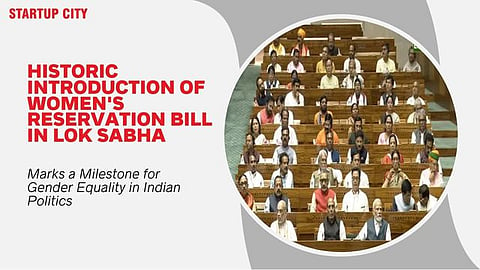

Prime Minister Narendra Modi Calls September 19th a "Historic Day" as Crucial Legislation Resurfaces After Three Decades
New Delhi: In a momentous development that could reshape the landscape of Indian politics, the Women's Reservation Bill, which seeks to establish a 33 per cent quota for women in the Lok Sabha and state legislative assemblies, was presented in the Lok Sabha on September 19th.
Prime Minister Narendra Modi, in a significant address, hailed the occasion as a "historic day" for Indian democracy. The bill, officially referred to as the 'Nari Shakti Vandan Adhiniyam,' has long been in the making, with its origins dating back nearly thirty years.
If passed, this legislation has the potential to significantly increase the number of women Members of Parliament (MPs) in the Lok Sabha, currently standing at 82, to a remarkable 181.
Congress leader Adhir Ranjan Chowdhury acknowledged the Women's Reservation Bill's origins within his party, highlighting the consistent efforts made by past Congress governments under the leadership of Rajiv Gandhi, PV Narasimha Rao, and Manmohan Singh to pave the way for women's political participation.
However, he also noted with regret that despite the bill's successful passage in the Rajya Sabha during the Congress-led Manmohan Singh era, it remained stagnant in the legislative pipeline.
On the other hand, Union Home Minister Amit Shah refuted this claim, asserting that the bill had already lapsed. Numerous attempts and obstacles over the years have indeed marked the journey of the Women's Reservation Bill.
The Constitution (One Hundred and Twenty-Eighth Amendment) Bill, 2023, brings forth pivotal articles and clauses within the Constitution aimed at catalyzing gender empowerment in the realm of politics:
New Clause in 239AA mandates reserving seats for women in the Delhi Legislative Assembly. It further designates that one-third of the seats allocated for Scheduled Castes (SCs) must be reserved for women, alongside one-third of the total seats filled through direct elections.
New Article - 330A: This article centres on reserving seats for women in the Lok Sabha. It establishes that one-third of the seats earmarked for SCs and Scheduled Tribes (STs) should also be reserved for women. Additionally, one-third of the total seats filled through direct elections to the Lok Sabha are to be reserved for women.
New Article - 332A: Addressing reserved seats for women in every state Legislative Assembly, this article mirrors the provisions of Article 330A. It mandates that one-third of the seats set aside for SCs and STs shall be reserved for women, along with one-third of the total seats filled through direct elections to the Legislative Assembly.
New Article - 334A: This article outlines the activation of the reservation policy after the delimitation process following the publication of relevant figures from the first census. It also establishes a rotation system for seats designated for women after each subsequent delimitation exercise.
The Women's Reservation Bill's journey traces back to 1996, initially introduced in the Lok Sabha during the United Front government led by Deve Gowda. Despite subsequent re-presentations in 1998, 1999, 2002, and 2003, the bill encountered impediments in securing the necessary support for passage.
In 2008, during the UPA government led by Manmohan Singh, the bill was tabled in the Rajya Sabha and successfully passed in 2010. However, it remained unaddressed in the Lok Sabha and eventually lapsed with the dissolution of the 15th Lok Sabha in 2014.
The current revival of the Women's Reservation Bill in the Lok Sabha signifies a fresh attempt to rectify gender disparities in Indian politics. If approved, it promises to usher in a historic shift in the representation of women in the country's legislative bodies.
New Article - 330A: This article centers on reserving seats for women in the Lok Sabha. It establishes that one-third of the seats earmarked for SCs and Scheduled Tribes (STs) should also be reserved for women. Additionally, one-third of the total seats filled through direct elections to the Lok Sabha are to be reserved for women.
New Article - 332A: Addressing reserved seats for women in every state Legislative Assembly, this article mirrors the provisions of Article 330A. It mandates that one-third of the seats set aside for SCs and STs shall be reserved for women, along with one-third of the total seats filled through direct elections to the Legislative Assembly.
New Article - 334A: This article outlines the activation of the reservation policy after the delimitation process following the publication of relevant figures from the first census. It also establishes a rotation system for seats designated for women after each subsequent delimitation exercise.
The Women's Reservation Bill's journey traces back to 1996, initially introduced in the Lok Sabha during the United Front government led by Deve Gowda. Despite subsequent re-presentations in 1998, 1999, 2002, and 2003, the bill encountered impediments in securing the necessary support for passage.
In 2008, during the UPA government led by Manmohan Singh, the bill was tabled in the Rajya Sabha and successfully passed in 2010. However, it remained unaddressed in the Lok Sabha and eventually lapsed with the dissolution of the 15th Lok Sabha in 2014.
The current revival of the Women's Reservation Bill in the Lok Sabha signifies a fresh attempt to rectify gender disparities in Indian politics. If approved, it promises to usher in a historic shift in the representation of women in the country's legislative bodies.
The bill's progress will be closely monitored as it traverses the intricate pathways of parliamentary deliberation and decision-making.The bill's progress will be closely monitored as it traverses the intricate pathways of parliamentary deliberation and decision-making.